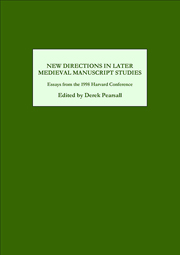Book contents
- Frontmatter
- Contents
- List of Illustrations
- Acknowledgements
- Introduction
- Recent Directions in Medieval Manuscript Study
- Another Fine Manuscript Mess: Authors, Editors and Readers of Piers Plowman
- A New Approach to the Witnesses and Text of the Canterbury Tales
- Prospecting in the Archives: Middle English Verse in Record Repositories
- Medieval Manuscripts and Electronic Media: Observations on Future Possibilities
- Representing the Middle English Manuscript
- Skins, Sheets and Quires
- Reconsidering the Auchinleck Manuscript
- Professional Readers of Langland at Home and Abroad: New Directions in the Political and Bureaucratic Codicology of Piers Plowman
- Professional Scribes? Identifying English Scribes Who Had a Hand in More Than One Manuscript
- Manuscript Production in Medieval Theatre: The German Carnival Plays
- The ‘Lancelot-Graal’ Project
- After Chaucer: Resituating Middle English Poetry in the Late Medieval and Early Modern Period
- Notes on Contributors
- Index
Recent Directions in Medieval Manuscript Study
Published online by Cambridge University Press: 05 September 2014
- Frontmatter
- Contents
- List of Illustrations
- Acknowledgements
- Introduction
- Recent Directions in Medieval Manuscript Study
- Another Fine Manuscript Mess: Authors, Editors and Readers of Piers Plowman
- A New Approach to the Witnesses and Text of the Canterbury Tales
- Prospecting in the Archives: Middle English Verse in Record Repositories
- Medieval Manuscripts and Electronic Media: Observations on Future Possibilities
- Representing the Middle English Manuscript
- Skins, Sheets and Quires
- Reconsidering the Auchinleck Manuscript
- Professional Readers of Langland at Home and Abroad: New Directions in the Political and Bureaucratic Codicology of Piers Plowman
- Professional Scribes? Identifying English Scribes Who Had a Hand in More Than One Manuscript
- Manuscript Production in Medieval Theatre: The German Carnival Plays
- The ‘Lancelot-Graal’ Project
- After Chaucer: Resituating Middle English Poetry in the Late Medieval and Early Modern Period
- Notes on Contributors
- Index
Summary
You may have noticed the divergences of my title from that of the conference as a whole: ‘Recent’ for ‘New’ and ‘Study’ for ‘Studies’. I am not confident that much of what I am going to talk about, nor, I suspect, other speakers, is entirely new, and whereas they may legitimately devote their interest and attention to single approaches in the study of manuscript books of the high and later Middle Ages, I believe my task is to try to survey and relate all in a more inclusive view, and, riskily, to supply anticipated omissions. I hope it will be seen that I am at a disadvantage in having to guess what the following speakers are going to discuss, from the titles they have given to their talks and what I know of some, if not all, of their previous work. I am taking it that our starting date is c. 1100, as first announced, and, from the programme, that the focus is on northern Europe and predominantly England.
I think I can best illustrate from my own experience the difference between probably the majority of students of medieval manuscripts, who concentrate on a restricted range of questions, if perhaps aware of wider ones, and those of us who have come to be inquisitive almost equally about every feature. Like many of the speakers here I started in English literature, by trying to discover who were the earliest readers and hearers of the late fourteenth-century alliterative poem of Piers Plowman, and when I decided that I could not find enough direct and indirect evidence about that work I extended my research to a much wider audience of Middle English religious verse and prose. These were of course not even then untrodden paths; they have come more recently to be called Reception Studies, by what I think is a legitimate extension of the sense of an older German or French term, but I am disinclined to theorize about it.
- Type
- Chapter
- Information
- New Directions in Later Medieval Manuscript StudiesEssays from the 1998 Harvard Conference, pp. 1 - 14Publisher: Boydell & BrewerPrint publication year: 2000



